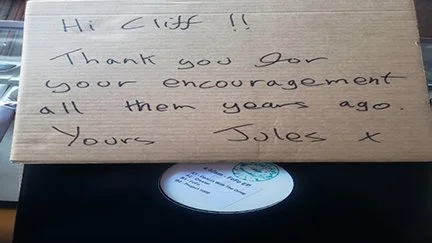Cliff Yankovich experiences the power of music
By Justin Tiemeyer - Contributing Writer
10 Jan. 2025
Sunday, Oct. 27, 2013 was an impactful day for Cliff Yankovich. The Lowell area jeweler and co-owner of Chimera Design had just suffered a powerful loss, and he needed to do something about it. This was before he moved into the city and ran for city council, back when Yankovich had a house in the country with a drum set and all sorts of electronic gadgets he used to make music. Music was, and is, deeply important for Yankovich, and it was the day that the music died all over again. Singer, songwriter, and guitarist Lou Reed, of Velvet Underground fame but with a solo career spanning decades after the group’s dissolution, had just passed away at the age of 71. “We lost the rock ‘n’ roll animal today,” Yankovich lamented on Facebook. “Rock in perpetuity, Lou.”
Yankovich had seen Lou Reed perform at Grand Valley back in the day, and he had seen him again in the mid-‘80s at Fountain Street Church. Reed was larger than life, and even in his later years, he was out and about, notably supporting the Occupy Wall Street movement in 2011. However, Reed was not invincible. He had suffered from hepatitis and diabetes for a long time, developed liver cancer, and received a liver transplant at the Cleveland Clinic mere months before his death, claiming it made him feel “bigger and stronger.”
While working on a musical tribute to Reed, Yankovich stumbled upon the music of D.J. Jules on Soundcloud, and he was drawn to one song in particular. “Hosa” was the name of the track, and it starts out as a simple base line and basic beat, a funky little something you might hear in a film about mob bosses trying to evade the FBI. As it progresses, it grows in complexity before folding back in on itself at the end. The same simplicity as the bookends of “Hosa” that makes it easy for fellow DJs to beat-match and transition during live sets, prompted Yankovich to imagine what additional layers he might add to the track, and the net result was a song, titled “Salute To Lou Reed,” that Yankovich released on Wednesday, Nov. 13, 2013, on Soundcloud as BigRedDawg. “Lou is gone,” Yankovich said, upon releasing his tribute track. “Long live Lou.”
Yankovich reached out to D.J. Jules to ask for permission to use his song as the backdrop for a splattering of quotes, some from an interview with Reed and others, lyrics penned by Reed and read aloud by Yankovich himself. In the process of gaining D.J. Jules’ consent, Yankovich must have shared some kind words about the musician’s works, but more on that later. Yankovich had assembled a track that boiled “Hosa” down to its essential core, and what started as an attempt to commemorate one musician, turned into a symposium on the power of music, a theme close to both Reed and Yankovich.
Yankovich thought that was the end of it…
What he was not aware of was just the extent that the creation of “Salute To Lou Reed” had affected D.J. Joules, because, over in London, the musician was working on a project titled “4:32am” that featured a familiar track, titled “Dancin With The Dawg.” Whereas, Yankovich’s song was built around the simplicity of D.J. Joules’ drums and bass, this new track was constructed around samples of Yankovich talking with fun electronic riffs building over the top. The “Dawg” in “Dancin With The Dawg” was a reference to BigRedDawg, Yankovich’s Soundcloud moniker.
It was not until Yankovich received an unexpected package in the mail that he became aware of what had been happening overseas. since the release of his Lou Reed tribute track. D.J. Joules, as “4:32am” had finished a four-track record called “FeFe EP,” and on side A, track one, the vinyl equivalent of a newspaper writer getting an article on the front page above the fold, he had featured his tribute to Yankovich. Packed with the record, Yankovich received a piece of cardboard with the following written in sharpie marker: “Hi Cliff!! Thank you for your encouragement all them years ago. Yours, Jules.”
Yankovich immediately took a picture and posted it to Facebook as his cover photo. Those unfamiliar with the story might have thought it a gift from Yankovich’s wife, Julie DeVoe, whose first name easily converts to Jules, but, no, this was a gift from a D.J. in London. Lowell’s own Cliff Yankovich was featured on a track playing in the London club scene. What an unexpected and deeply satisfying fact.
While Yankovich is not certain what encouragement he gave D.J. Joules, a solution might be found by viewing these two artists as reflections of one another across the Atlantic Ocean. Yankovich was absolutely tickled that something he had created was used by D.J. Joules as the seed for one of his songs. Yankovich posted about it on Facebook, told his friends and family about it. D.J. Joules did not have to say, “You are a huge influence of mine. Please keep doing things you love and putting yourself out there.” The song itself was encouragement enough, and the same might be true of Yankovich’s homage to D.J. Joules that started off the exchange.
Such, as Reed, Yankovich, and D.J. Joules would likely agree, is the power of music.


